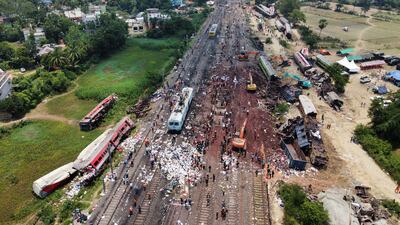Railway services have resumed nearly 50 hours after a deadly three-train crash in India left at least 275 people dead and about 1,100 passengers injured.
Work was completed on the stretch of track at Balasore in Odisha state after the two passenger trains and a freight train crashed into each other in one of the worst train disasters in the country in decades.
A freight train started its journey on the restored tracks near Bahanaga railway station late on Sunday, followed by a semi-high-speed Vande Bharat Express train on Monday.
The freight train was flagged off by Railway Minister Ashwini Vaishnaw.
The train – the first to run on the stretch of track since the accident – was carrying coal and headed to Rourkela Steel Plant in Odisha from a port in the southern city of Vizag. It started the journey at about 10.40pm.
Passenger train services have also resumed on the stretch.
“Down-line restoration complete. First train movement in section,” he wrote alongside a video on Twitter.
On Friday, 21 coaches from the Coromandel Express, which runs between the eastern cities of Kolkata and Chennai, and the Howrah Superfast Express, travelling north between the cities of Bengaluru and Howrah, derailed near Bahanaga station at about 7pm.
The Coromandel Express was travelling at 128kph while the other passenger train was travelling at 126kph, railway officials said.
A freight train standing on an adjoining track was also involved.
There were more than 3,400 passengers travelling in the two trains.
More than 1,000 workers were involved in restoration work at the site. Heavy machinery, including a 140-tonne railway crane and four road cranes, was used.
The workers cleared the mangled heap of coaches that had either derailed or mounted one another due to the powerful force of the collision. They laid fresh tracks and repaired overhead wires.
On Sunday, officials said the crash was probably caused by human error.
Mr Vaishnaw said it happened due to “a change in electronic interlocking”.
An electronic interlocking system prevents the routes of different trains coming into conflict through the arrangement of the tracks. The aim of the system is to ensure no train is given the signal to proceed unless the route is proven safe.
















